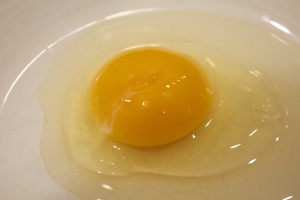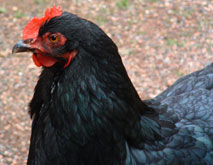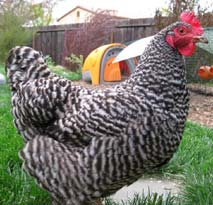
|
Grazin’ Angus Acres Eggs From the Union Square Green Market If you want eggs from chickens that are truly roaming around outside, you have to go for what is called “pastured” eggs. These are the types of eggs that one usually finds when buying at a greenmarket, farm, or community buying club. Pastured chickens are free to roam, peck, and wander around in the fresh air. They eat supplementary feed to round out their diet of foraged bugs, worms, and fly larvae. Pastured eggs have beautiful orange yolks, which stand up proudly on top of the glossy whites. Pastured eggs are loaded with Omega 3’s and beta carotenes. They taste immeasurably better and have more vital energy than a supermarket egg, even the organic variety. I’ve never heard of a pastured egg from a well-treated healthy chicken containing salmonella. It’s a given for me that these eggs are definitely worth seeking out. That being said, even at Union Square there’s quite a selection of eggs to choose from, and a price range that goes from 4 to 8 dollars a dozen. I wanted to find out why this was so. To satisfy my curiosity, I spoke at length two days ago to the farmer manning the booth at Grazin’ Angus Acres. I asked him why his eggs were so much more expensive than everyone’s at the market. What I got was an interesting earful of details about his farming methods. Grazin’ Angus Acres 450 acre farm, located in Ghent, New York, is for grass fed and finished Black Angus beef. They also have pasture raised chickens for eggs. During the summer months they also raise chickens for meat. The owner Dan Gibson says “it’s all about the grass.” He works an additional couple thousand acres where he raises grasses and hay to feed the cattle and chicken throughout the winter. Dan proudly displays pictures of his egg mobiles and his happy chickens roaming on the grass. The farmer at the booth told me that one of the reason Dan’s eggs are so expensive is that he keeps his chicken on pasture the entire year. The grasses he grows for the winter are also expensive. The supplemental feed that he purchases for them is organic, grown by a local farmer. (I had heard before from other farmers that what usually drives up the price of eggs is the use of organic supplemental feed.) The feed currently includes organic corn and soy, but they are working on developing a feed that does not contain soy. Dan Gibson’s egg mobiles are quaint-looking old hay rig tractor gear that he built with local lumber. The chicken are ushered into the egg mobiles every night to protect them from predators. The chickens and cattle on the farm have a symbiotic relationship around the cultivated grasses. At Grazin’ Angus Acres they have four kinds of grasses, including high sugar carbohydrate rye grasses and two broad leaf clovers – all of which fix nitrogen out of the air and bring it into the soil. The fertile soil feeds the grasses which feeds the cows and chickens. The folks at Grazin Acres manage the grazing carefully. They corral the cows into a designated area for a 24 hour period, where the cows eat most of the grass and trample the rest. They leave behind their organic material. The chickens are brought in about three days later, just as the fly larvae are about to emerge. The chickens scratch the patties apart, eat the larvae (which cut down on the number of flies on the farm), and spread the manure. There’s no need for a tractor or fossil fuel. Chicken manure is apparently the best organic fertilizer known to man. It helps the grass grow, which helps the cows grow, which helps the chickens. The relationship is perfectly symbiotic. Of his 400 hens, 200 are Black Australorp and 200 are Barred Plymouth Rocks. The average hen lays 6 eggs a week, which comes to about 10 dozen a day. Grazin’ Angus Acres are at the Union Square green market Friday and Saturday. They are at Carroll Gardens and The Natural History Museum on Sundays. Share on Facebook and Twitter | Eggs, Greenmarket Bits, ingredients, Where To Buy (Sources) | No comments
|




Leave a Reply